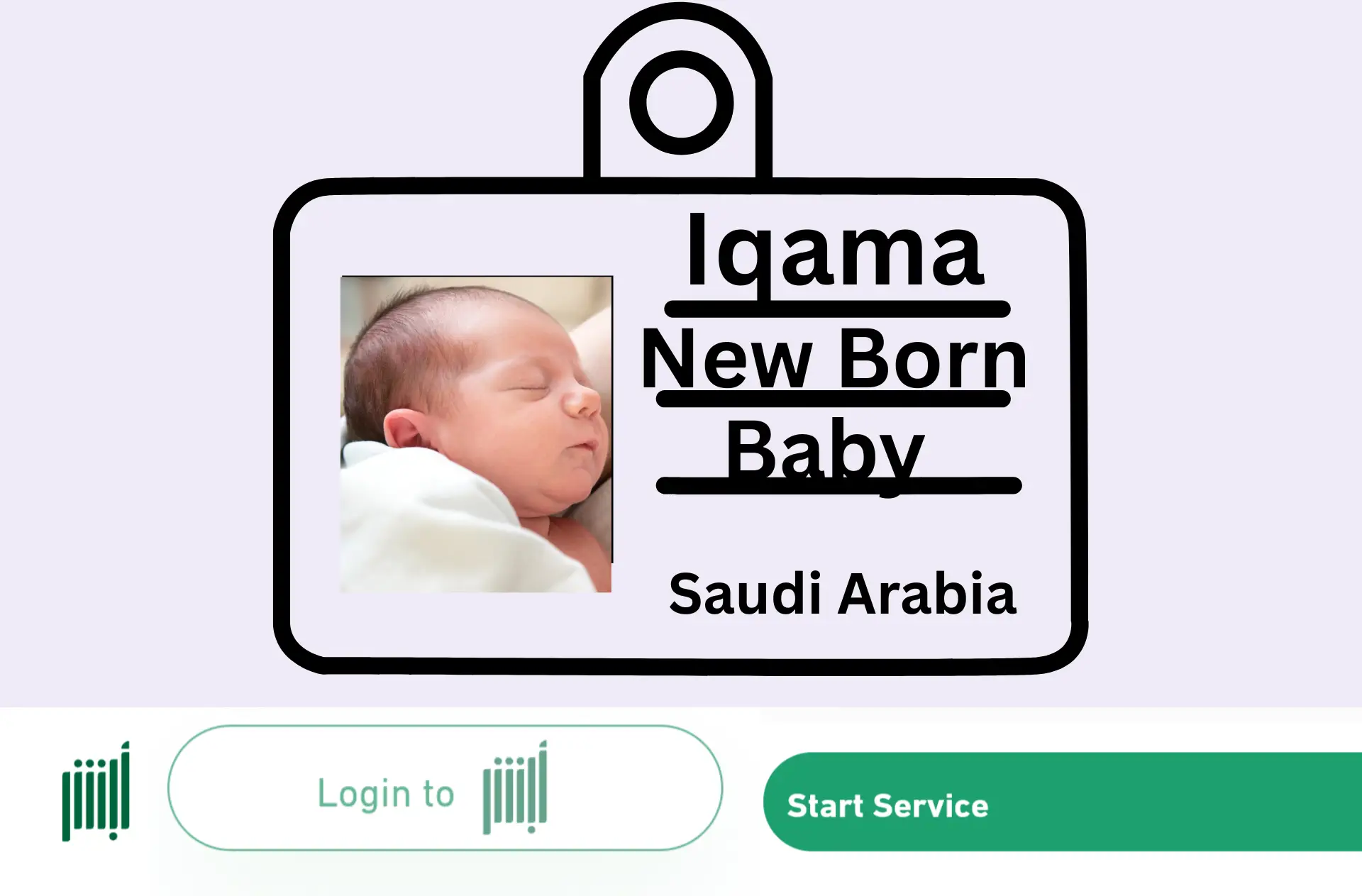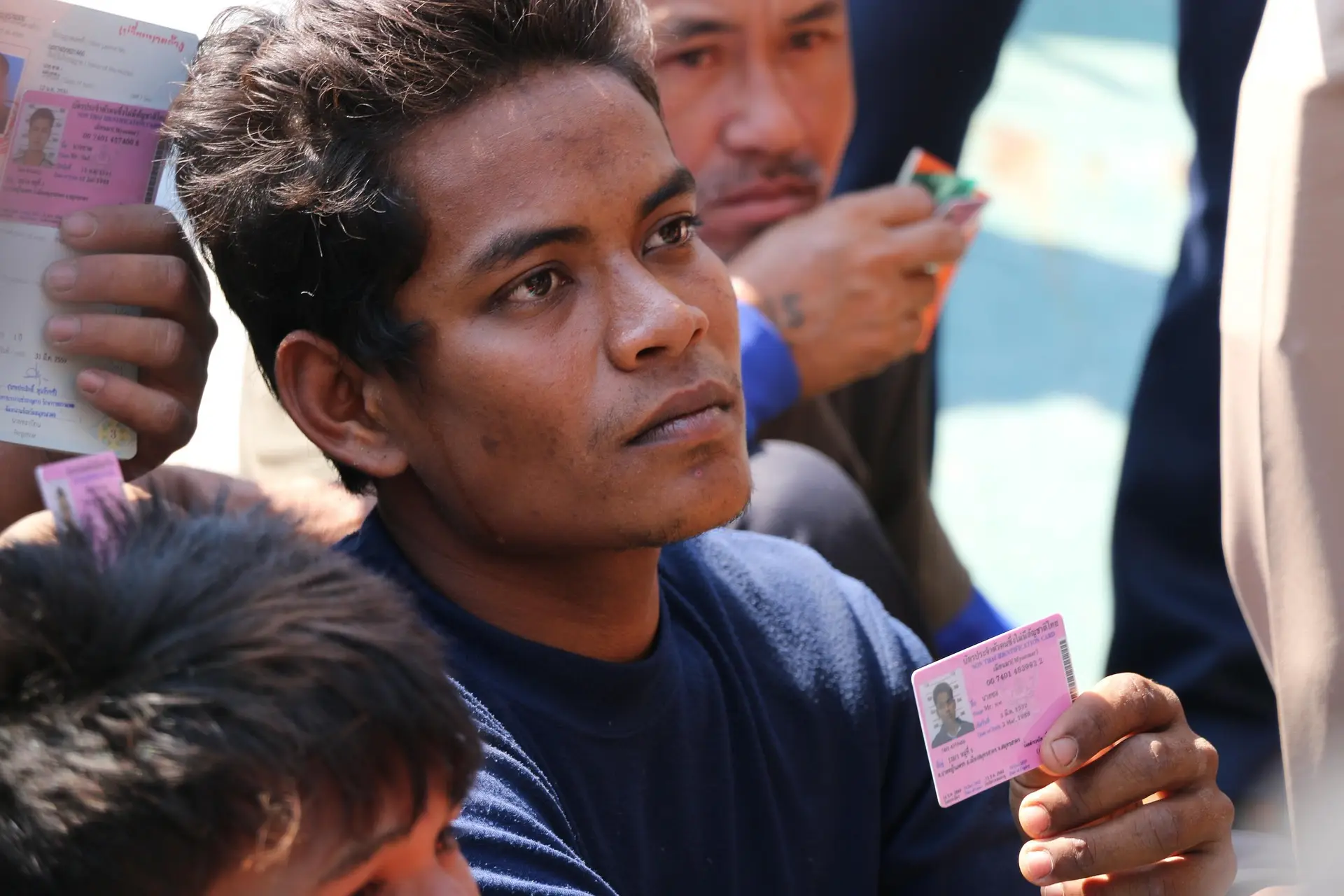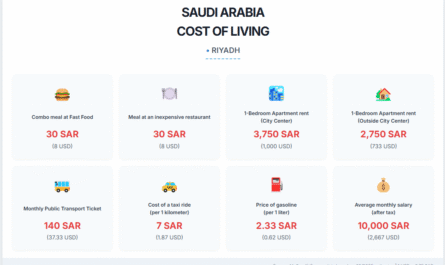![]() Written by Waqas | ⏱️ Read Time: 15 minutes | 📅 Last Updated: Aug 13, 2025
Written by Waqas | ⏱️ Read Time: 15 minutes | 📅 Last Updated: Aug 13, 2025
If you’ve recently had a baby in Saudi Arabia, one of the first things to arrange is the iqama for newborn baby. This official residence permit is essential for legal recognition, healthcare access, travel, and other services. Knowing how to apply for the iqama for your newborn baby in 2025 can help you avoid delays and unnecessary stress.
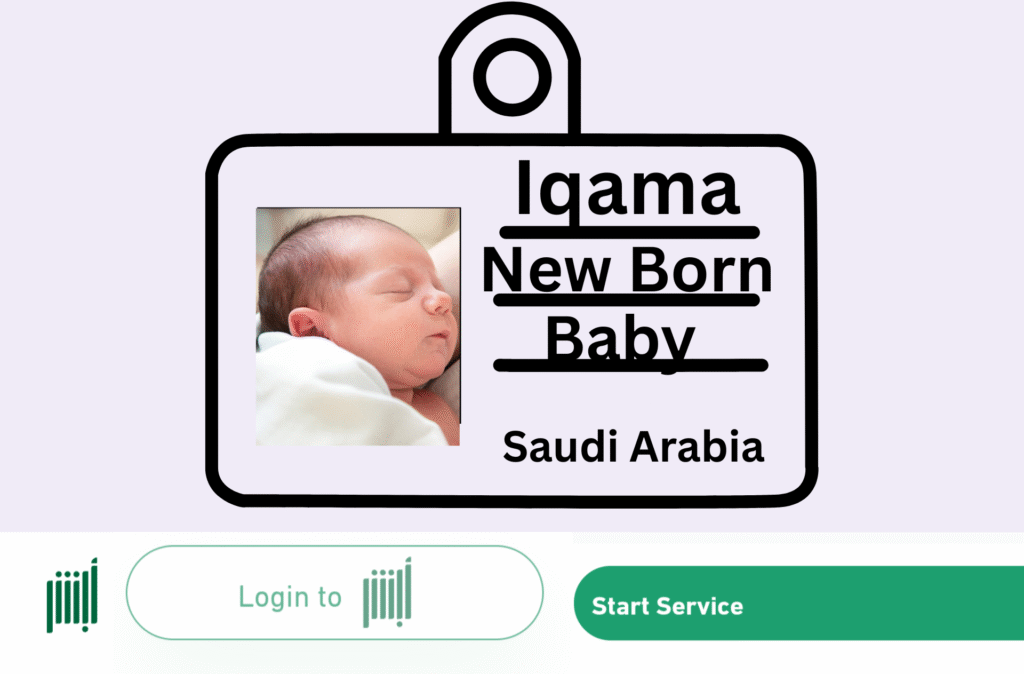
Table of Contents
Why You Need an Iqama for Your Newborn Baby in Saudi Arabia

Obtaining an Iqama for your newborn baby is a legal requirement for all expatriate families residing in Saudi Arabia. This residency permit officially registers your child as a legal resident, enabling access to healthcare, vaccinations, education, and other government services. Without a valid Iqama, your baby may face serious issues when it comes to travel, medical care, and even routine documentation within the Kingdom.
Who Is Responsible for Applying for the Newborn’s Iqama in Saudi Arabia
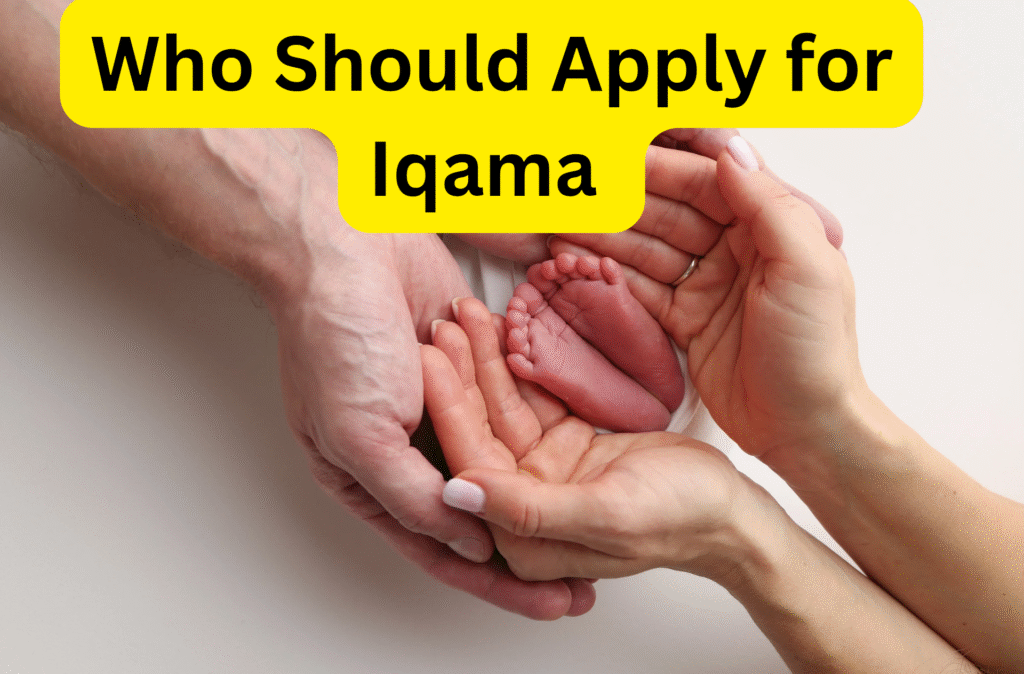
In Saudi Arabia, the Iqama for your newborn baby must be applied for by the parent listed as the sponsor on their own Iqama — usually the father. However, if the mother is the legal sponsor, she can also complete the application process. It’s crucial to start the application soon after your baby’s birth, ideally within the first few weeks, to avoid any delays or penalties.
Documents Required to Apply for a Newborn’s Iqama in Saudi Arabia
To apply for the Iqama for your newborn baby, you’ll need to gather several important documents. Ensure all copies are clear, valid, and up to date to avoid any delays in processing. Below is the standard document checklist for 2025:
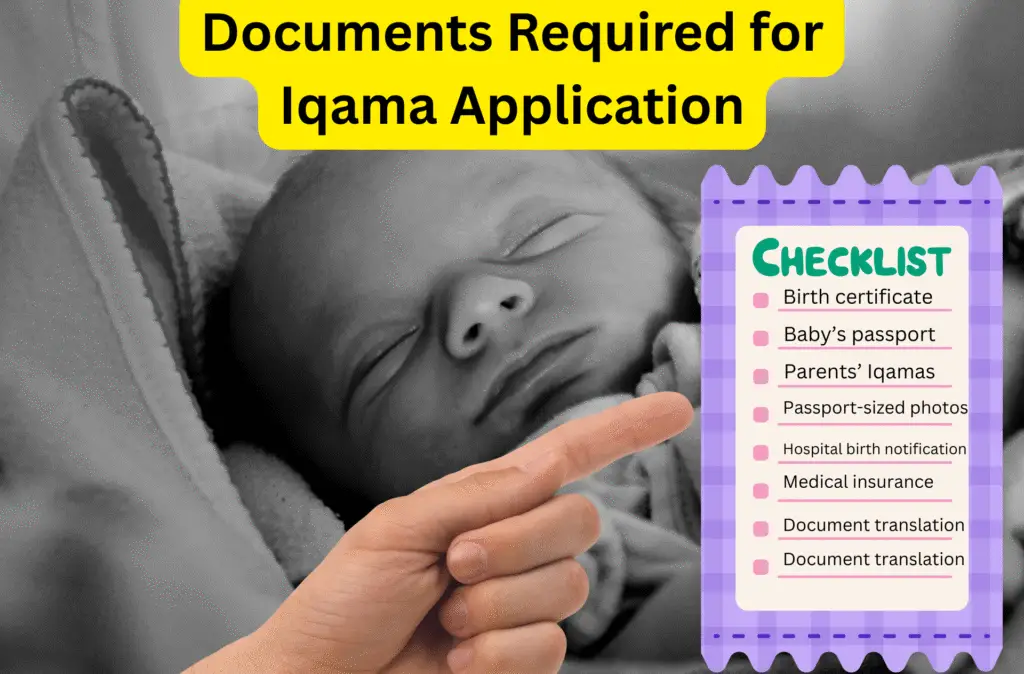
📄 Required Documents:
- Original and copy of your baby’s birth certificate (issued in Saudi Arabia)
- Baby’s passport, issued by your home country’s embassy
- Copies of both parents’ Iqamas and passports
- Passport-sized photos of the newborn (white background)
- Hospital birth notification
- Medical insurance for the newborn (if required by your local Jawazat office)
- Translated and attested documents, if any originals are not in Arabic
💡Tip: Keep both physical and digital copies ready. Some steps may require uploading documents through Absher or submitting them during an in-person visit to Jawazat (General Directorate of Passports).
Step-by-Step Guide: How to Apply for Iqama for a Newborn Baby in Saudi Arabia
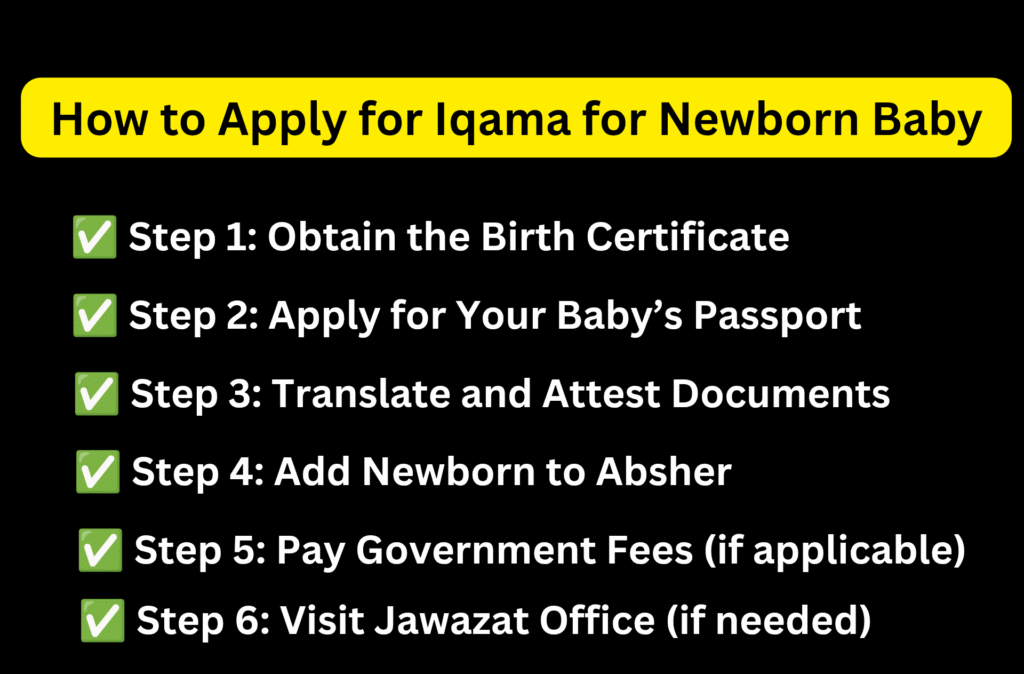
Applying for the iqama for your newborn baby in Saudi Arabia involves a few official steps. Follow this 2025 process carefully to avoid delays:
✅ Step 1: Obtain the Birth Certificate
Get the official birth certificate from the Ministry of Health using the hospital’s birth notification. This usually takes a few working days.
✅ Step 2: Apply for Your Baby’s Passport
Visit your country’s embassy in Saudi Arabia to apply for your baby’s passport. Some embassies may require an appointment and specific documents.
✅ Step 3: Translate and Attest Documents
If your baby’s passport or birth certificate is not in Arabic, get them translated and attested by relevant authorities.
✅ Step 4: Add Newborn to Absher
Log in to the Absher platform and add your newborn under your family records. You may need to upload some documents here.
✅ Step 5: Pay Government Fees (if applicable)
Depending on your visa type and category, there might be a fee to issue the iqama. Use SADAD or other official payment channels.
✅ Step 6: Visit Jawazat Office (if needed)
Some cases may require a personal visit to the Jawazat office. Bring original documents, and you may receive the Iqama on the spot or within a few days.
💡 Pro Tip:
Always double-check current requirements on Absher or the Jawazat website, as procedures can vary slightly based on location or sponsor status.
How Much Does It Cost?
The cost of getting an iqama for your newborn baby in Saudi Arabia can vary depending on your visa type and your company’s policies. However, here are the typical costs expat families can expect in 2025:
- Iqama issuance fee: Usually SAR 500 to SAR 1,000 (may vary based on the sponsor’s profession or status)
- Medical insurance: Required for the Iqama, with basic plans starting around SAR 400 per year
- Document translation and attestation: If needed, this can cost between SAR 100–300 per document
- Passport fee: Paid to your embassy (amount varies by nationality)
Some employers cover these costs, so it’s a good idea to confirm with your HR department before proceeding.
Iqama Timeline – How Long It Takes
The time it takes to get an iqama for your newborn baby depends on how quickly each step is completed and how busy the government offices are. On average, the process takes 1 to 3 weeks, if all documents are ready and correct.
Here’s a general breakdown:
- Birth certificate: 2–5 working days
- Passport from embassy: 1–2 weeks (can vary)
- Absher registration and Jawazat approval: Within a few days after submitting
Delays can happen if documents are incomplete, translations are missing, or embassy appointments take longer. To avoid this, start the process as soon as possible after your baby is born.
Important Deadlines & Penalties
Applying for the iqama for your newborn baby must be done within 90 days of birth. This is a strict requirement in Saudi Arabia. Missing this deadline can lead to late application penalties.
Here’s what to keep in mind:
- Deadline: Apply within 90 days of the baby’s birth date.
- Penalty for delay: A fine of SAR 1,000 may be applied if you exceed the deadline.
- Other risks: Without an Iqama, your baby won’t be able to access government health services, be added to insurance, or travel easily.
To avoid unnecessary stress and extra costs, begin the process as early as possible and track each step carefully.
Common Mistakes to Avoid
When applying for the iqama for your newborn baby, even small mistakes can cause big delays or penalties. Here are some common errors to watch out for:
- Delaying the application: Waiting too long to start the process often leads to missing the 90-day deadline and paying fines.
- Missing documents: Forgetting essential items like translated certificates or parents’ Iqama copies can halt the process.
- Incorrect Absher entry: Errors while adding your child to Absher can create record mismatches, requiring extra visits to Jawazat.
- Not confirming embassy requirements: Each embassy has different rules for issuing a baby’s passport. Not checking early can lead to delays.
- Skipping translation and attestation: If non-Arabic documents aren’t officially translated and stamped, they might not be accepted.
Staying organized and double-checking every step will save you time, money, and effort.
Tips for a Smooth Iqama Process
To make the process of getting an iqama for your newborn baby as smooth as possible, a little preparation goes a long way. Here are some helpful tips:
- Start early: Begin the paperwork for the iqama for newborn baby as soon as your child is born. This helps you stay well within the 90-day deadline and avoid any late penalties.
- Keep all documents ready: Prepare scanned copies of every required file, including translations and passport photos, to avoid delays while applying for the iqama for newborn baby.
- Use Absher efficiently: Familiarize yourself with the Absher platform so you can submit and track your application without errors.
- Follow up with embassy: Book appointments early and confirm all passport requirements to avoid unexpected delays.
- Double-check names and details: Ensure your baby’s name, date of birth, and passport number match exactly across all documents.
Iqama Renewal for Children
Once you’ve received the iqama for your newborn baby, it’s important to remember that it must be renewed regularly—just like adult Iqamas. Renewal is usually required annually, depending on your sponsor’s contract and visa type.
Here are a few key points:
- Renewal through Absher: Most renewals for the iqama for newborn baby can be done online through the Absher platform, making the process easier for parents.
- Fees: Renewal fees for the iqama for newborn baby are usually lower than for adults, and in many cases, employers may cover the cost.
- Update insurance: Make sure your child’s medical insurance is active and linked during the renewal process.
- Monitor expiry dates: Keep track of the Iqama expiry date to avoid fines or service interruptions.
Keeping your child’s Iqama current ensures uninterrupted access to healthcare, school enrollment, and travel.
If you’re also wondering about the general Iqama processing timeline beyond newborns, check out our detailed guide on How Long Does It Take to Get Iqama in Saudi Arabia. It explains the typical duration, delays, and what to expect for various visa types — a helpful resource for new and returning expats alike.
FAQs About Iqama for Newborn Baby in Saudi Arabia
How soon should I apply for the iqama for my newborn baby?
You should apply within 90 days of your baby’s birth to avoid fines and legal issues.
Can I travel with my newborn before getting the iqama?
Your newborn needs a valid passport to travel, but without the iqama for your newborn baby, re-entry to Saudi Arabia may be difficult. It’s best to apply as early as possible.
Who can apply for the iqama for a newborn baby?
The parent who is the legal sponsor on their Iqama, typically the father, is responsible for applying.
What if I miss the 90-day deadline?
You may face fines, and the process could become more complicated. It’s important to contact Jawazat immediately to understand your options.
Do I need medical insurance for my newborn’s iqama?
Yes, having valid medical insurance is mandatory for the issuance and renewal of the iqama.
Can both parents apply for the iqama for newborn baby?
Usually, the parent who is the sponsor on their own iqama is responsible. However, in some cases, the mother can apply if she is the sponsor.
Is the iqama for a newborn baby issued immediately after application?
No, it usually takes 1 to 3 weeks after submitting all documents and completing the process.
What happens if the baby’s documents are not in Arabic?
You must get them translated and attested by official authorities before submission.
Can I add my newborn baby to my health insurance without an iqama?
No, the iqama is required to officially register your child on your medical insurance plan.
Does the iqama for a newborn baby expire?
Yes, the iqama must be renewed periodically, typically every year.
Can a newborn baby get an iqama if born outside Saudi Arabia?
Yes, but you must follow a slightly different process, starting with a birth certificate from the country of birth and then applying through the embassy.
Are there specific visa types that affect the iqama for newborn baby?
Yes, the type of visa held by the sponsoring parent can influence the process of applying for the iqama for newborn baby. For example, expats working under private companies, government institutions, or international organizations may face different requirements, timelines, or cost responsibilities. Always check with your HR department or sponsor to understand what applies to your specific case.
Can I apply for the iqama for my newborn baby online?
Yes, many steps can be completed through the Absher platform, but some documents may require a physical visit.
